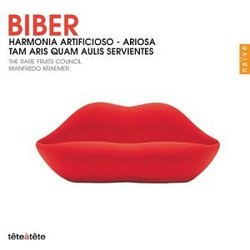| All Artists: Heinrich Ignaz Franz von Biber, Rare Fruits Council, Manfredo Kraemer Title: Biber: Harmonia Artificioso - Ariosa; Tam Aris Quam Aulis Servientes Members Wishing: 0 Total Copies: 0 Label: Astree Release Date: 11/18/2003 Genre: Classical Styles: Chamber Music, Historical Periods, Baroque (c.1600-1750), Classical (c.1770-1830) Number of Discs: 2 SwapaCD Credits: 2 UPC: 822186030028 |
Search - Heinrich Ignaz Franz von Biber, Rare Fruits Council, Manfredo Kraemer :: Biber: Harmonia Artificioso - Ariosa; Tam Aris Quam Aulis Servientes
 | Heinrich Ignaz Franz von Biber, Rare Fruits Council, Manfredo Kraemer Biber: Harmonia Artificioso - Ariosa; Tam Aris Quam Aulis Servientes Genre: Classical "Of all the violin players of the last century Biber seems to have been the best, and his solos are the most difficult of any music I have seen of the same period." It is in these terms that the 18th century English music ... more » |
Larger Image |
